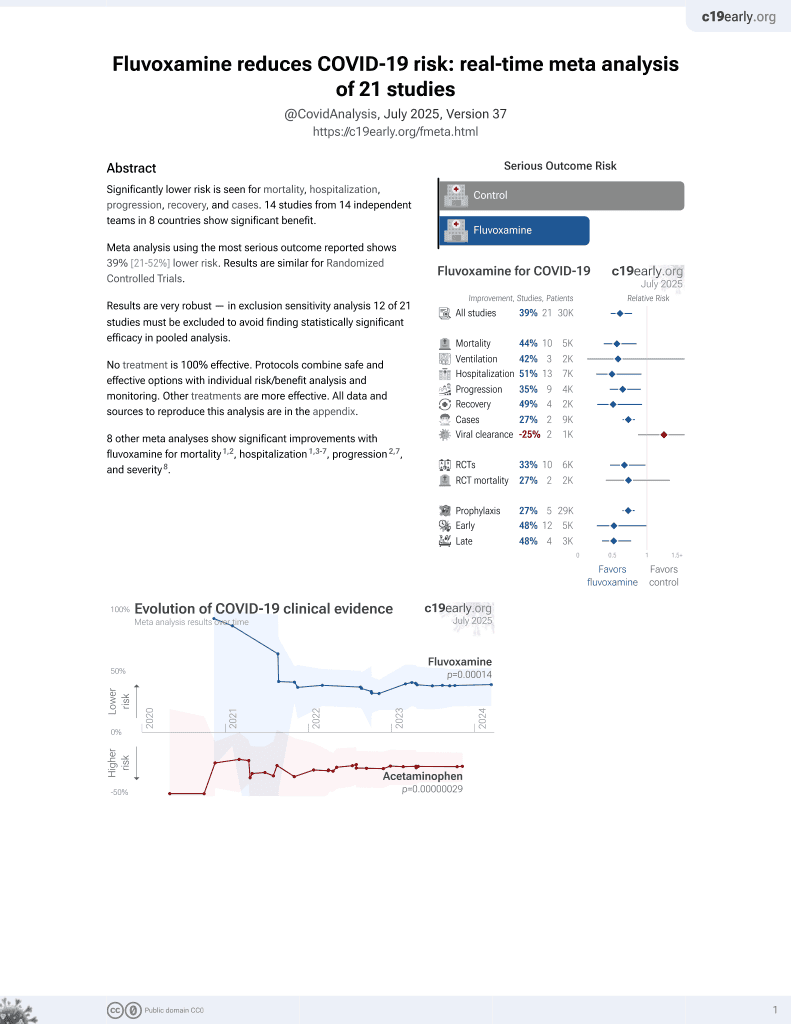
Antidepressants for prevention of severe COVID-19, Long COVID and outlook for other viral diseases
et al., Frontiers in Medicine, doi:10.3389/fmed.2024.1305184, Feb 2024
31st treatment shown to reduce risk in
November 2021, now with p = 0.00014 from 21 studies, recognized in 2 countries.
No treatment is 100% effective. Protocols
combine treatments.
6,400+ studies for
210+ treatments. c19early.org
|
Review of clinical studies on the potential benefits of antidepressants for prevention and treatment of COVID-19 and its sequelae. Authors summarize evidence from retrospective studies, randomized controlled trials, prospective studies, and meta-analyses suggesting that antidepressants, especially selective serotonin reuptake inhibitors and serotonin-norepinephrine reuptake inhibitors, may help prevent SARS-CoV-2 infection, reduce COVID-19 severity and mortality, and potentially alleviate long COVID symptoms. Proposed mechanisms include direct antiviral effects and anti-inflammatory properties. Authors make a case for considering inexpensive and available antidepressants as adjunctive therapy, emphasizing their affordability and availability.
1.
Scheim et al., Back to the Basics of SARS-CoV-2 Biochemistry: Microvascular Occlusive Glycan Bindings Govern Its Morbidities and Inform Therapeutic Responses, Viruses, doi:10.3390/v16040647.
2.
Hashimoto, K., Overview of the potential use of fluvoxamine for COVID-19 and long COVID, Discover Mental Health, doi:10.1007/s44192-023-00036-3.
3.
Hashimoto (B) et al., Mechanisms of action of fluvoxamine for COVID-19: a historical review, Molecular Psychiatry, doi:10.1038/s41380-021-01432-3.
4.
Hashimoto (C) et al., Old drug fluvoxamine, new hope for COVID-19, European Archives of Psychiatry and Clinical Neuroscience, doi:10.1007/s00406-021-01326-z.
5.
Hoertel et al., Repurposing antidepressants inhibiting the sphingomyelinase acid/ceramide system against COVID-19: current evidence and potential mechanisms, Molecular Psychiatry, doi:10.1038/s41380-021-01254-3.
Bonnet et al., 20 Feb 2024, peer-reviewed, 3 authors.
Abstract: TYPE Opinion
PUBLISHED 20 February 2024
DOI 10.3389/fmed.2024.1305184
OPEN ACCESS
EDITED BY
Daniel Diaz,
National Autonomous University of
Mexico, Mexico
REVIEWED BY
Velyn Wu,
University of Florida, United States
*CORRESPONDENCE
Udo Bonnet
udo.bonnet@uni-due.de
RECEIVED 17 December 2023
ACCEPTED 05 February 2024
PUBLISHED 20 February 2024
CITATION
Bonnet U, Juckel G and Kuhn J (2024)
Antidepressants for prevention of severe
COVID-19, Long COVID and outlook for other
viral diseases. Front. Med. 11:1305184.
doi: 10.3389/fmed.2024.1305184
Antidepressants for prevention of
severe COVID-19, Long COVID
and outlook for other viral
diseases
Udo Bonnet1,2*, Georg Juckel3 and Jens Kuhn4,5
1
Department of Mental Health, Evangelisches Krankenhaus Castrop-Rauxel, Academic Teaching
Hospital of the University of Duisburg/Essen, Castrop-Rauxel, Germany, 2 Department of Psychiatry
and Psychotherapy, Faculty of Medicine, Landschaftsverband Rheinland-Hospital Essen, University of
Duisburg-Essen, Essen, Germany, 3 Department of Psychiatry, Psychotherapy and Preventive Medicine,
LWL University Hospital, Ruhr University Bochum, Bochum, Germany, 4 Department of Psychiatry and
Psychotherapy, University Hospital Cologne, Cologne, Germany, 5 Alexianer Hospital Cologne,
Cologne, Germany
KEYWORDS
antidepressants, resilience, prevention, COVID-19, Long COVID, Post COVID, PACS
COPYRIGHT
© 2024 Bonnet, Juckel and Kuhn. This is an
open-access article distributed under the
terms of the Creative Commons Attribution
License (CC BY). The use, distribution or
reproduction in other forums is permitted,
provided the original author(s) and the
copyright owner(s) are credited and that the
original publication in this journal is cited, in
accordance with accepted academic practice.
No use, distribution or reproduction is
permitted which does not comply with these
terms.
